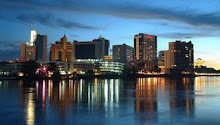The ads promoting "Malaysia: Truly Asia" aim to welcome visitors with a warm smile to a prosperous and modern nation, so the taxi fleet branded "the worst in the world" can come as a bit of a shock.
Even the locals are not spared the shabby service of unkempt and hostile drivers behind the wheels of decrepit vehicles who refuse to use the meter, overcharge and pick-and-choose which destinations they will travel to.
At the popular KLCC mall under Kuala Lumpur's iconic Petronas Twin Towers is a typical scene, as a gang of cabbies negotiate with a young Norwegian couple just metres from a signboard warning against "taxi touts".
"Flat rate, flat rate, no metre," one driver insists as the tourists try to find a cab to take them to their hotel, less than two kilometres (1.2 miles) away.
Anxious to escape the baking heat, they agree to pay 25 ringgit (7.22 dollars) for a trip that would have cost less than three ringgit on the meter.
"Is it expensive? We don't know, we thought it is normal here," said the woman as they piled in with their shopping bags.
More frequent visitors, however, are vocal in their criticism and say that aggressive and unprofessional drivers are tarnishing the nation's image as a squeaky clean and hospitable destination.
"I first visited Malaysia in 2006 and I was impressed by everything I saw except for the worst taxi service I have endured," said Kabir Dali, an Indian tourist waiting in vain for a metered taxi at another mall.
"I paid a whopping 260 ringgit (74 dollars) from the Kuala Lumpur International Airport to town and was later told that was twice the proper amount."
Complaints about taxis are common in many countries, but in Malaysia it has escalated to an outpouring of frustration, on blog sites and in letters to newspapers.
In a survey by the local magazine The Expat, some 200 foreigners from 30 countries rated Malaysia the worst among 23 countries in terms of taxi quality, courtesy, availability and expertise.
The respondents lashed the fleet as "a source of national shame" and "a serious threat to tourists -- rude bullies and extortionists".
Salvation is in sight though, as a number of smaller, up-scale operators enter the market to provide a more expensive but quality taxi service for frustrated visitors and locals.
The uniformed drivers, behind the wheels of smart new multi-purpose vehicles and sedans, switch on the meter as a matter of course and do not refuse destinations -- surprising and delighting commuters in the capital.
Abdul Razak, operations manager for Dubai-based Citicab which launched here in January, said that even in poorer nations such as Thailand and Indonesia, taxis are smarter and the drivers far more courteous.
"I would say it is the worst in this region, undoubtedly. I have travelled to all countries in this region and our company operates taxis in many parts of the world. The situation here is the worst I have seen," he told AFP.
"The vehicles are in shabby condition, the driver will take you if he likes your face -- that is, if he agrees with where you want to go for the price he insists on."
The government has called on taxi firms to lift their standards, but various campaigns have achieved little, and many blame the lack of enforcement on rampant corruption in the police and bureaucracy.
"It is difficult for the roads and traffic department to take stern action," said a security officer at one city mall as he watched the touts swoop.
"Taxi operators and the company which hold the licences are all linked to some politician or another," he said. "Drivers here are ruthless because they are unchecked by authorities who are almost non-existent."
John Koldowski, from the Pacific Asia Travel Association, said that "less than desirable" taxi drivers have an outsize impact on a nation's image.
"The first contact a tourist gets with locals is often during airport transits to hotels and it creates a very, very strong first impression, either be good or bad," he said.
"Authorities certainly need to do their jobs and act upon any complaints strongly, quickly and visibly."
Even the locals are not spared the shabby service of unkempt and hostile drivers behind the wheels of decrepit vehicles who refuse to use the meter, overcharge and pick-and-choose which destinations they will travel to.
At the popular KLCC mall under Kuala Lumpur's iconic Petronas Twin Towers is a typical scene, as a gang of cabbies negotiate with a young Norwegian couple just metres from a signboard warning against "taxi touts".
"Flat rate, flat rate, no metre," one driver insists as the tourists try to find a cab to take them to their hotel, less than two kilometres (1.2 miles) away.
Anxious to escape the baking heat, they agree to pay 25 ringgit (7.22 dollars) for a trip that would have cost less than three ringgit on the meter.
"Is it expensive? We don't know, we thought it is normal here," said the woman as they piled in with their shopping bags.
More frequent visitors, however, are vocal in their criticism and say that aggressive and unprofessional drivers are tarnishing the nation's image as a squeaky clean and hospitable destination.
"I first visited Malaysia in 2006 and I was impressed by everything I saw except for the worst taxi service I have endured," said Kabir Dali, an Indian tourist waiting in vain for a metered taxi at another mall.
"I paid a whopping 260 ringgit (74 dollars) from the Kuala Lumpur International Airport to town and was later told that was twice the proper amount."
Complaints about taxis are common in many countries, but in Malaysia it has escalated to an outpouring of frustration, on blog sites and in letters to newspapers.
In a survey by the local magazine The Expat, some 200 foreigners from 30 countries rated Malaysia the worst among 23 countries in terms of taxi quality, courtesy, availability and expertise.
The respondents lashed the fleet as "a source of national shame" and "a serious threat to tourists -- rude bullies and extortionists".
Salvation is in sight though, as a number of smaller, up-scale operators enter the market to provide a more expensive but quality taxi service for frustrated visitors and locals.
The uniformed drivers, behind the wheels of smart new multi-purpose vehicles and sedans, switch on the meter as a matter of course and do not refuse destinations -- surprising and delighting commuters in the capital.
Abdul Razak, operations manager for Dubai-based Citicab which launched here in January, said that even in poorer nations such as Thailand and Indonesia, taxis are smarter and the drivers far more courteous.
"I would say it is the worst in this region, undoubtedly. I have travelled to all countries in this region and our company operates taxis in many parts of the world. The situation here is the worst I have seen," he told AFP.
"The vehicles are in shabby condition, the driver will take you if he likes your face -- that is, if he agrees with where you want to go for the price he insists on."
The government has called on taxi firms to lift their standards, but various campaigns have achieved little, and many blame the lack of enforcement on rampant corruption in the police and bureaucracy.
"It is difficult for the roads and traffic department to take stern action," said a security officer at one city mall as he watched the touts swoop.
"Taxi operators and the company which hold the licences are all linked to some politician or another," he said. "Drivers here are ruthless because they are unchecked by authorities who are almost non-existent."
John Koldowski, from the Pacific Asia Travel Association, said that "less than desirable" taxi drivers have an outsize impact on a nation's image.
"The first contact a tourist gets with locals is often during airport transits to hotels and it creates a very, very strong first impression, either be good or bad," he said.
"Authorities certainly need to do their jobs and act upon any complaints strongly, quickly and visibly."
komen jefbuj:
Tidak dinafikan pengalaman naik teksi di KL amat menyakitkan hati. Mereka seolah2 tidak bagi muka kepada orang tempatan. Yang pelek nya mereka yang menentukan destinasi, bukan kita. Contohnya, kita hendak ke Bukit Bintang dari SOGO. Pemandu teksi boleh jawab ' tidak boleh, banyak jem ini jam! '. Walhal kita telah beratur di Taxi Stand berjam2 lamanya. Tapi bila Mat Salleh, ' no problem sir !' paham2 la alamat kena sembelih la pelancong tu. Perkara ni berlaku bertahun2 lama nya tapi siapa yang seharusnya memantau perkara ini????? Lu jawablah sendiri!
Apa2 pun saya kurang bersetuju dengan artikel di atas sebab kebanyakkan insiden berlaku di KL bukan di tempat lain. Sebab KL je nama Malaysia di sebut, terus jadi 'the worst in the entire world'. Tak adil kan? Ye lah kata orang tua, ' disebab nila setitik, rosak susu sebelanga! ' Negara dia orang tu bagus sangat ke???


















![jefbuj@labuan [2009]](https://blogger.googleusercontent.com/img/b/R29vZ2xl/AVvXsEj4h_3rX8pnVo2cE_VXHl0nzAwVXfRld9GDwDIFxsuqdcw1dUVTBS-w-3Edv30tyY_VAd4RaTsLZ0FJoAoHaFRfd1rTYhjnZJsmqXt9GmRt8J6fTJHvtHdazPeZlBFIdAllZOXQRNVVZf0/s220/075.JPG)











.jpg)






